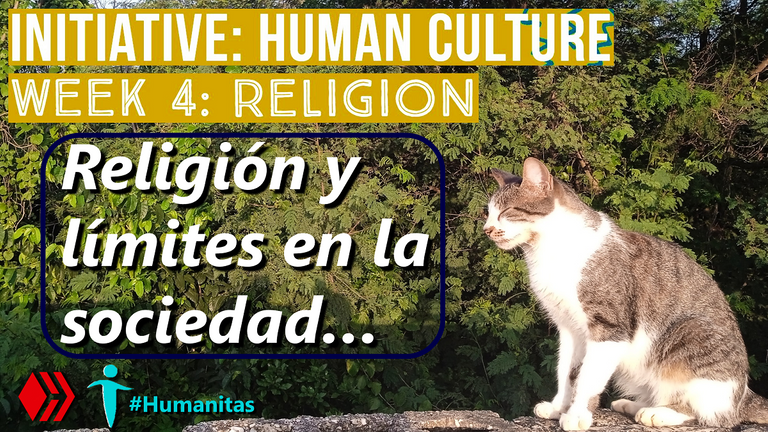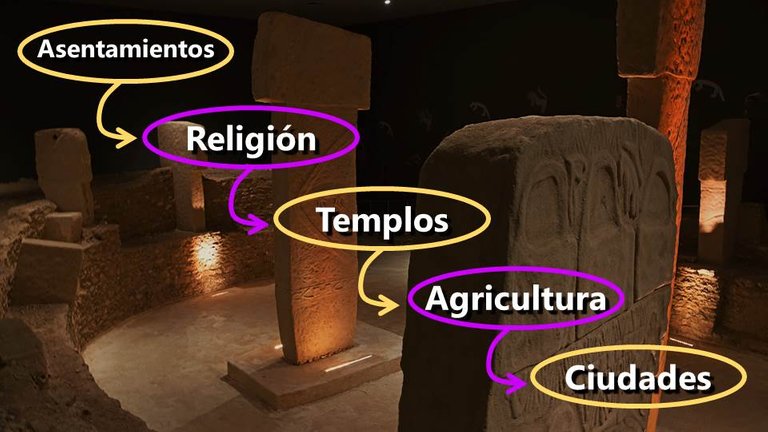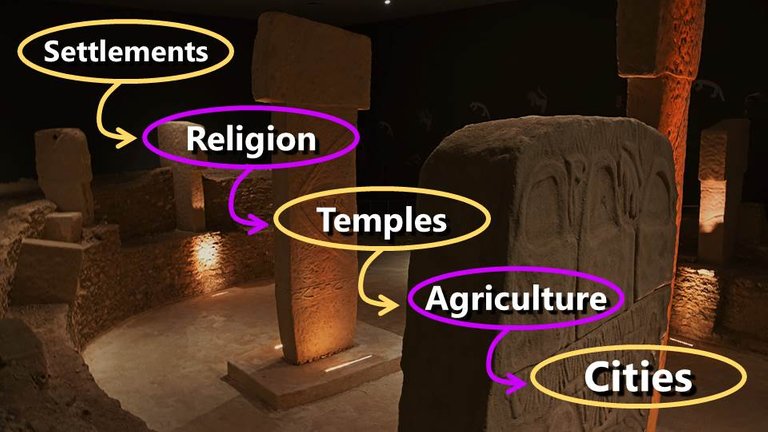Tenemos de nuevo en la comunidad #Humanitas una invitación a reflexionar sobre un tema esencial con respecto a lo humano. Cualquier usuario es bienvenido a escribir sobre el tema, el cual para esta semana es nada más y nada menos que la religión. Sin nada más que agregar, vamos a entrar en la materia.
Este es el enlace de la iniciativa: Iniciativa: Cultura Humana Semana 4: Religión. En la comunidad Humanitas.

¿Qué importancia tiene el fenómeno religioso? Esta pregunta la podemos encontrar entre las sugeridas en la iniciativa. Es un tema complejo, por lo que me parece que podríamos llegar a mejores conclusiones intentando responder todas o algunas de estas preguntas.
Ya de por sí la palabra religión puede generar cierto rechazo o polémica entre algunas personas. Pero, al mismo tiempo, muchas de estas mismas personas reconocen, en mayor o menor medida, su importancia en la historia y desarrollo de la humanidad. Algo que ha generado opiniones tan divididas sin duda tiene una gran importancia o influencia en el mundo, y se deben tomar en cuenta tanto las opiniones positivas como las negativas.
¿Es necesaria la religión para el desarrollo humano?
¿Has pensado en un mundo sin religión? De alguna manera, la religión ha servido de "regulador" en el comportamiento moral de la sociedad en la historia. Hace miles de años el ser humano empezó a reunirse en grupos cada vez más grandes, y para mantener el orden entre todos debían haber reglas o costumbres en común.
Hace un tiempo compartí una publicación sobre un tema muy interesante: ¿Fue primero la religión antes que la agricultura?.

En dicha publicación se hablaba del curioso caso de Göbekli Tepe, el lugar donde se encuentran los famosos monolitos en forma de "T", los cuales son 7000 años más antiguos que las Pirámides de Egipto. Allí pasó algo opuesto a lo que era considerado "normal" en el desarrollo de civilizaciones: primero surgió la religión y luego la agricultura, ciudades, etc.
Es decir, el punto aquí es que la cultura propició de alguna manera el desarrollo de una civilización más avanzada. Y no se hubiera logrado sin "códigos éticos" compartidos por toda la sociedad.
Pero con Göbekli Tepe estaríamos hablando de hace varios miles de años ¿Qué hay del mundo actual? Todos estos códigos éticos fueron "evolucionando", en varias partes del mundo, y se convirtieron, de alguna forma, en las religiones actuales. En la historia, un buen número de religiones o creencias fueron quedando abandonadas por otras más "efectivas".
Y con "efectivas" podríamos hablar de aquellas cuyas enseñanzas o costumbres fueron más propicias para el desarrollo de la civilización. En el caso de occidente, hablaríamls del cristianismo.
Pero esto puede chocar un poco con el estereotipo que se tiene de la religión como algo anticuado y opuesto a la innovación o a la ciencia. Es algo complicado de explicar, pero no necesariamente es tan así de cierto este estereotipo. Científicos importantes en la historia fueron parte de congregaciones religiosas. En tiempos medievales, iglesias y monjes de encargaron de preservar textos de importantes filósofos y matemáticos griegos, por ejemplo.

Pero sí, también existe un lado más "negativo" en la religión que puede llevar a restringir demasiado el desarrollo humano, o a no adaptarse a los tiempos actuales. Pero más que un "fallo" de la religión podríamos decir que es un fallo del mismo ser humano.
Lo importante aquí es que en "términos generales" es necesario que en la sociedad existan ciertos códigos morales en común. No me refiero a que todos necesariamente deban compartir la misma religión, pero sí a que haya cierta armonía, por lo que en cierta medida la religión es necesaria.
La religión, a mi modo de ver, es una forma de restricción, pero no en el sentido negativo de la palabra sino que limita el comportamiento de los individuos para encauzarlos a un futuro mejor. Si esas restricciones son muy fuertes, o muy débiles, el individuo y la sociedad no funcionarían de forma adecuada.
Cuando se habla de que la religión cristiana influenció al desarrollo de occidente, a mi manera de ver, no se trata de que todos tenían que ser cristianos o tener una vida religiosa, sino que esta religión puso "límites sanos" al desarrollo de la sociedad, hablando en términos generales, de manera que hasta los no religiosos tuvieran la suficiente libertad.
¿El fenómeno religioso en el ser humano es natural a el, o es producto de una mera convención social?
Creo que la religión sería algo natural al ser humano. Surgió hace miles de años entre las primeras civilizaciones humanas, como una manera de convivir, expresar el lado más espiritual y tener costumbres en común. Pero al mismo tiempo, también puede llegar a convertirse en una mera convención social, algo más "mecánico" y alejado de la espiritualidad, tal como podríamos ver hoy en día. En ese caso, es cuando podríamos separar religión y espiritualidad.
¿El fenómeno religioso complementa a la ciencia o le entorpece?
En mi opinión personal siempre he pensado que ambas cosas no están necesariamente en conflicto. Puede que en la historia la ciencia se haya visto limitada de alguna forma por la religión, pero recordemos que no es la religión en sí sino el ser humano quien comete errores. Creo que ambas áreas estudian lo mismo pero desde distintas perspectivas, ambas válidas, las cuales en algún punto, quizás más allá de nuestra comprensión, se tocan o se unen.
He tratado de abordar este tema desde una perspectiva más que todo histórica. En lo personal, no fue sino hasta recientemente que he empezado a valorar la importancia de la religión, es decir, puede que yo mismo no me considere una persona muy religiosa o dispuesta a llevar una vida muy ortodoxa, pero para muchas personas en el mundo la religión es algo de extrema importancia, o incluso algo que literalmente les ha salvado la vida.
Espero que hayas disfrutado de esta lectura. Deja tu comentario u opinión. Invito a participar en esta iniciativa a @gracielaacevedo @soyunasantacruz @rosahidalgo @luvilozada
English version
We have again in the #Humanitas community an invitation to reflect on an essential topic regarding the human. Any user is welcome to write about the topic, which for this week is nothing more and nothing less than religion. Nothing more to add, let's get into the subject.
This is the link to the initiative: Initiative: Human Culture Week 4: Religion. In the Humanitas community.

What is the importance of the religious phenomenon? This question can be found among those suggested in the initiative. It is a complex subject, so it seems to me that we could reach better conclusions by trying to answer all or some of these questions.
Already in itself the word religion can generate some rejection or controversy among some people. But at the same time, many of these same people recognize, to a greater or lesser extent, its importance in the history and development of humanity. Something that has generated so many divided opinions undoubtedly has great importance or influence in society, and both positive and negative opinions must be taken into account.
Is religion necessary for human development?
Have you ever thought of a world without religion? In some way, religion has served as a "regulator" in the moral behavior of society throughout history. Thousands of years ago human beings began to gather in larger and larger groups, and to maintain order among all, there had to be rules or customs in common.
Some time ago I shared a post on a very interesting topic: Did religion come first before agriculture.

There they talked about the curious case of Göbekli Tepe, where the famous "T" shaped monoliths are found, which are 7000 years older than the Pyramids of Egypt. Something opposite to what was considered "normal" in the development of civilizations happened there: first came religion, and then agriculture, cities, etc.
That is, the point is that culture somehow propitiated the development of a more advanced civilization. And it would not have been achieved without "ethical codes" shared by the whole society.
But with Göbekli Tepe we would be talking about several thousand years ago, what about today's world? All these ethical codes were "evolving", in various parts of the world, and became, in a way, the current religions. In history, a good number of religions or beliefs were abandoned for other more "effective" ones.
And by "effective" we could speak of those whose teachings or customs were more conducive to the development of civilization. In the case of the West, Christianity.
But this may clash a bit with the stereotype of religion as old-fashioned and opposed to innovation or science. It's a complicated thing to explain, but it's not necessarily that true. Important scientists in history were part of religious congregations. In medieval times, churches and monks were in charge of preserving texts of important Greek philosophers and mathematicians, for example.

But yes, there is also a more "negative" side to religion that can lead to restricting human development too much, or to not adapting to current times. But more than a "failure" of religion we could say that it is a failure of the human being himself.
The important thing here is that in "general terms" it is necessary in society that there be certain moral codes in common, not necessarily that everyone should share the same religion, but that there be harmony, so to a certain extent religion is necessary.
Religion, in my view, is a form of restriction, but not in the negative sense of the word, but it limits the behavior of individuals in order to channel them to a better future. If these restrictions are too strong or too weak, the individual and society would not function properly.
When it is said that the Christian religion influenced the development of the West, to my way of thinking, it is not that everyone had to be Christian or have a religious life, but that this religion put "healthy limits" to the development of society, speaking in general terms, so that even the non-religious had enough freedom.
Is the religious phenomenon in human beings natural to them, or is it the product of a mere social convention?
I believe that religion would be something natural to human beings. It arose thousands of years ago among the first human civilizations, as a way of living together, expressing the most spiritual side and having customs in common. But at the same time, it can also become a mere social convention, something more "mechanical" and far from spirituality, as we could see today. In that case, it is when we could separate religion and spirituality.
Does the religious phenomenon complement science or obstruct it?
In my personal opinion, I have always thought that the two are not necessarily in conflict. It may be that in history science has been limited in some way by religion, but let's remember that it is not religion itself but the human being who makes mistakes. I believe that both areas study the same thing but from different perspectives, both valid, which at some point, perhaps beyond our comprehension, touch or unite.
I have tried to approach this subject from a historical rather than a personal perspective. Personally, it was not until recently that I have begun to appreciate the importance of religion, that is, I may not consider myself to be a very religious person or willing to lead a very orthodox life, but for many people in the world religion is something of extreme importance, or even something that has literally saved their lives.
I hope you enjoyed this reading. Leave your comment or opinion.
Translated to English language with the help of DeepL.com
Fotografía de portada de autoría propia.
Otras redes sociales:
 |
 |
 |
 |
F1 & motorsports: @acontmotor
 |
 |
 |
 |
| ¡Gracias por visitar! — ¡Thanks for visiting!  |




